Food-related social projects in Lisbon

“The first essential component of social justice is adequate food for all mankind. Food is the moral right of all who are born into this world.” – Norman Borlaug, biologist and humanitarian.
We are very fond of projects that combine the world of food with a strong social component. We are firm believers that there is quite probably nothing else on earth that brings people together more than the act of eating. It’s something we all share no matter what our background is: not only do we need to eat to survive, meals are inherently a social activity and what we cook and choose to present to our families and peers on the plate has to do with our culture and identity. This is exactly the kind of message we try to share during our food and cultural walks in Lisbon.We have been following the work of a few Lisbon-based projects which we think are doing a tremendous job, promoting social justice and values we stand for, both related to social justice and the environment, and always using food as a medium. We are proud to share some of them with you here:
Cozinha Popular da Mouraria
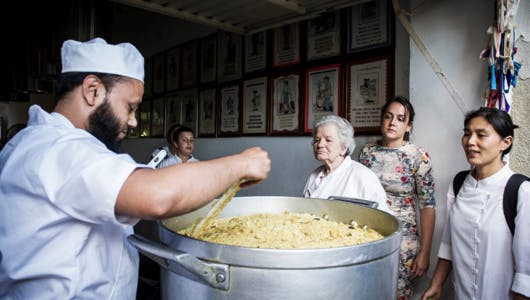
Mouraria is one of the most culturally diverse neighborhoods in Lisbon. The former Moorish Quarter of the city (circa the 1300s) was, for centuries, the favored place for immigrants to settle down at and, nowadays, Mouraria is home to folks of at least fifty different nationalities. Cozinha Popular da Mouraria translates as “Mouraria’s popular kitchen” or, even more accurately, it presents itself as Mouraria’s kitchen for the people. For its many diverse people!
This is a non-profit association that works towards promoting multiculturalism via a series of initiatives that involve the neighborhood’s residents, visitors from elsewhere in the city and, quite often, even tourists. This popular kitchen is a meeting place for people to come to share, learn with one another and, at the end of the day, expand their horizons by getting closer to other cultures they might have been a little less familiar with. All of this, of course, via cooking and eating together. Those who want to get more actively involved with Cozinha Popular da Mouraria might be given the chance to organize a themed night of their country which sometimes goes beyond what’s on the menu and may even include other cultural activities such as music or performance.
In their own words, Cozinha Popular da Mouraria is “a space to exchange ideas and cultures, cook, share and so much more”. Indeed it seems like the volunteers at this non-profit seem tireless as they keep putting together themed events as well as new initiatives. For instance, they have a more recent project going on, under the name Projeto Receitas. Projeto Receitas involves the south Asian community living in Lisbon, through a series of events in which they share their own recipes, with focus on healthy and culturally sensitive meals. Another of Cozinha Popular da Mouraria’s programs is Projeto Substância, which supports the growth of business ideas in the field of food production.
Even if you are just passing by Lisbon, you may want to check out Cozinha da Popular da Mouraria. Browse their program of events on social media, and you just might find yourself enjoying one of the most authentic Thai meals you could have never dreamt of having in Portugal itself.
🍴Rua das Olarias 5, 1100-012 Lisboa
www.instagram.com/cozinhapopulardamouraria
Crescer

Crescer is also a non-profit, this time working in the field of community intervention with the most vulnerable sections of the population. This translates in various initiatives, food related and otherwise.
Here we will be highlighting Crescer’s food centric initiatives, namely the restaurants they are running, in which they train and employ the vulnerable folks they aim to support. Their most mediatic initiative is, by far, É Um Restaurante, a restaurant whose name simply translates as “this is a restaurant”. É Um Restaurante is a pilot project for the social reintegration of homeless people. This project has been supported by consultant chef Nuno Bergonse, popular for having worked in other prominent Portuguese restaurants. This casual fine dining restaurant has, quite literally, been changing people’s lives. And while the meals you can enjoy there might not be life changing per se, they can be quite memorable indeed! Furthermore, when dining at É Um Restaurante, you know you’ll directly be supporting the seventy five people that they take on board each year. After having worked here for one year and gathering the necessary experience to thrive on their own, employees of the restaurant are mentored into looking for other jobs, so that the project can keep taking in more vulnerable individuals and giving them a chance.
Besides É Um Restaurante, Crescer has also launched other eateries. On one hand, they’ve opened É Um Mesa, a hybrid between a restaurant and a bar, focusing mainly on pizzas. And, on the other, they also opened an outdoor place called É Uma Esplanada, where you can chill while enjoying cocktails, wine and petiscos.
Make sure to visit one of Crescer’s restaurants while in Lisbon because they have great food, top-notch service and, of course, the work they are doing is commendable and needs to be supported by all.
🍴É Um Restaurante
📍Rua São José 56, 1150-321 Lisboa
🍴É Uma Mesa
📍Rua Rio Cávado 3, 1600-740 Lisboa
🍴É Uma Esplanada
📍Largo Trindade Coelho, Museu de São Roque 1200-470 Lisboa
www.instagram.com/eumaesplanada
Associação Pão a Pão
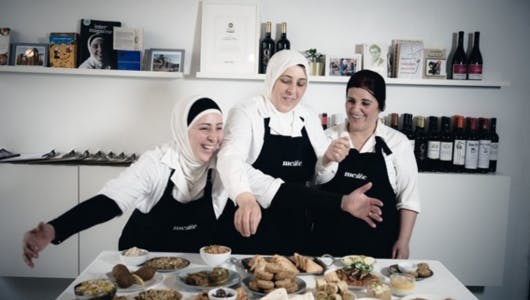
NGO Pão a Pão came about during the Syrian refugee crisis, when people escaping the war in Syria started arriving in Portugal. During a conversation with one of those refugees, she was asked what she missed the most from home and, when she replied “bread!”, the seed for Pão a Pão, which literally translates as “bread by bread”, was planted.
In a nutshell, they work with the aim to promote the integration of both refugees and immigrants through training and employability. In the team’s own words, “we value people’s knowledge, experience and culture and these are the elements we use to facilitate inclusion and create more diverse, vibrant communities”.
Just like we do, the team that founded Pão a Pão also believes that many of the greatest ideas are shared around the table. During meals people gather, exchange experiences, brainstorm and, also, social bonds are forged.
Using food as a medium for inclusion, the first public project materialized by Pão a Pão was Mezze, a restaurant focusing on cuisine from the Middle East. Through delectable food cooked by refugees, Mezze helps break down old prejudices. Mezze employs people from different nationalities, and all their stories and photos can be seen on their website, to give each individual a voice. Because this is a place for cultural exchange, Mezze doesn’t just serve food. It also organizes cooking workshops and even debates.
The truth is that, social aspects aside, Lisbon lacked an authentic Middle Eastern cuisine restaurant before Mezze came around, so it was a much welcome addition to the dining scene of our city. In recent years, we might have become a little more spoiled for choice, but Mezze still prepares incredible mezze sets, which are like the tapas equivalent of the Middle East. Meat-centric, vegetarian or even vegan mezze sets can be ordered and enjoyed, knowing that not only you’re feasting on genuine food prepared by the expert hands of those who know best, you are also supporting Pão a Pão’s current and future projects which, for now, include Mezze itself and Mezze Escola for hospitality training of new professionals, but that has in the past also included Mão-Cheia (which means “handful”). Mão-Cheia was discontinued after Covid but it was a really interesting project showcasing the brilliant ideas Pão a Pão keeps cooking. It consisted of a restaurant where only non-professional cooks above 60 years of age were invited to prepare a meal, following a traditional recipe from their home country. Mão-Cheia featured cooks from, amongst other countries, Portugal, Guinea Bissau, Mozambique and Morocco… we hope they come back sometime as it was such a lovely project!
🍴Mezze
📍Rua Ângela Pinto 40D 22/23, 1900-069 Lisboa
Kitchen Dates
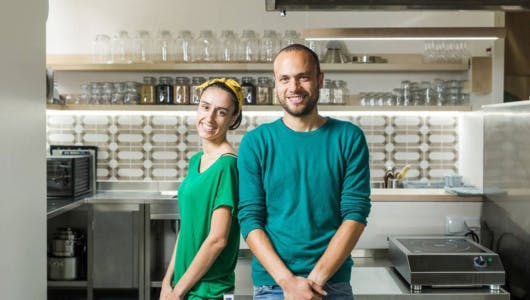
Kitchen Dates was Portugal’s first ever restaurant without a trash can. The zero-waste kitchen movement was brilliantly implemented by a couple who, after having organized dinners at their own place for a couple of years, decided to finally open a commercial space. Not only were they zero waste, they were also committed to using only local products – not even from all across the Portuguese territory, but truly from nearby places only. Interestingly enough, that didn’t seem to limit their recipes, as they had a daily changing menu of delicious savory and sweet treats, as well as home-made sourdough bread and plant-based cheeses.
Unfortunately, Kitchen Dates restaurant didn’t survive the Covid19 Pandemic, but the project is still thriving in other forms.
Today, Kitchen Dates is a multidimensional food literacy project, which helps to spread information amongst the general public, as well as support organizations to reduce their carbon footprint. They send a super well-researched newsletter focusing on different themes and they have also recently launched a new podcast called Próprio para Consumo (that is portuguese for “appropriate to consumption”), about food and the environmental crisis.
Kitchen Dates’ duo keeps busy by researching and sharing information with their audience, via free subscription for their mailing list on social media, as well as making public appearances on talks and debates about the connection between the food industry and the environment. Every now and then, they also cook on pop-up events, where they showcase zero waste good practices which make the most of each ingredient, but also minimize the use of other disposable resources which we may take for granted when we are in the kitchen, but that Kitchen Dates shows us we could very easily do without.
Joy Food Experiences
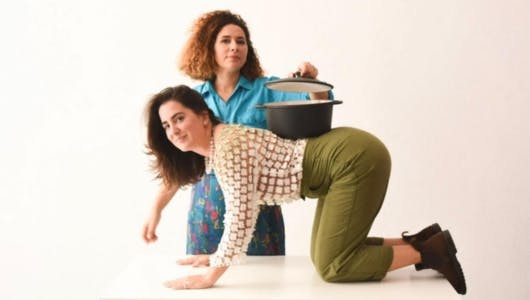
Alice Artur and Joana Trindade Bento come together as Joy Food Experiences. These food researchers and lovers organize multiple experiences that bring together the worlds of food and art. They do site specific cooking shows that aim towards empowerment and integration through food literacy.
So what does this all translate into? In reality, a lot. Joy Food Experiences does plenty, and their events are quite varied. We could say though that they’re specialists at creating dinner performances, mixing food and art, but always in a way that speaks clearly about a given theme, often socially charged. Recent examples of this are the “The Imaginary Dinner” they created to spark conversation about the future of food, or “Comida e Liberdade” (food and freedom), about food and democracy, allusive to the celebrations of the 25th of April, the day of the Portuguese revolution.
Joy was born about half a decade ago as a catering company. They have provided food to events, as well as developed menus for restaurants and cafes as consultant chefs. But, in recent years, we’re pleased to see that the work of Alice and Joana has gone down a more unique path and we hope they keep developing ideas and events which are always one of a kind!
ℹ️ www.instagram.com/joy.foodexperiences
Food From the Block
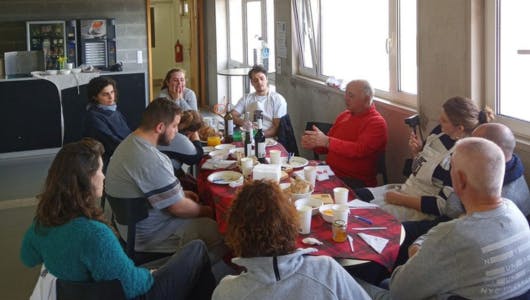
Food From the Block is an initiative by LOCALS, a non-profit organization that aims to promote local development actions based on participatory projects. They recognize that the act of, not only eating, but actually cooking together, has tremendous potential to bring folks closer together and to form deep bonds, and so they organize cooking events for community engagement.
They operate in specific neighborhoods of Lisbon, where they invite the local community to organize cooking events, where not only locals get to participate, but everyone from the city is invited not just for the sake to come and try the food, but above all to come share experiences and create memories. In Food From the Block’s team’s own words “more than a food literacy project, this is a journey through the various local food systems and how, from here, more resilient and healthy communities can be created.”
Food From the Block keeps putting together all sorts of food related projects, always with a strong social motivation behind them. Some of the most eye-catching events they’ve run include workshops to fight against food waste, healthy eating awareness programs, talks about food systems and local & global sustainability, and more.
Keep checking their Instagram below and it may just happen that they organize one of their public events when you’re in town!
ℹ️ www.instagram.com/food.fromtheblock
Cozinha Com Alma
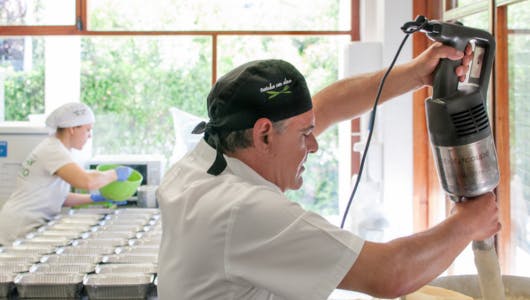
Not exactly in Lisbon, but in nearby Cascais, Cozinha Com Alma (which translates as “kitchen with a soul”) has made their mission to support and empower families who are experiencing temporary financial difficulties. They do so by giving them access to quality meals at a symbolic price.
Cozinha Com Alma is essentially a shop selling ready to eat meals to take-away. The profits they make go towards covering the operational costs as well as funding the meals for the families in need they want to support, not just via access to food with dignity, but by more complex follow-up plans that aim to aid these families beyond access to food. This sustainable social business has a brilliant model that has managed to support many families which suffer from what they call “shameful poverty”. In many cases, adults in these families even have jobs, but, in the current economic situation, that doesn’t always mean that they can actually provide good food (and other basic necessities) for their dependents. And this is where Cozinha Com Alma comes in, by at least covering one of the most basic needs: the access to proper nourishing food.
For those who want to be actively involved, Cozinha Com Alma welcomes volunteers to help with logistics, namely keeping up the store and packing meals for take-away.
🍴 Praceta Padre Marçal da Silveira 31, 2750-672 Cascais
À MESA!
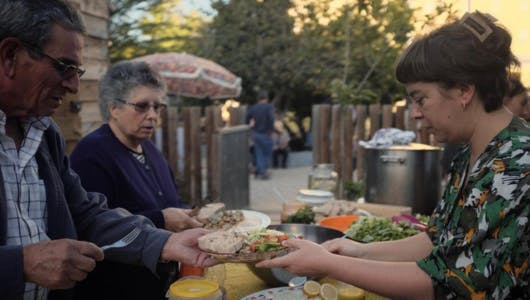
À MESA!, which translates as “at the table”, is an itinerant social canteen. They have no definitive address, but their ideas seem to be quite clear: they recognize that there is a food crisis going on and they want to fight for better access to proper food for all.
For them, good food means locally grown and financially accessible, something which is nowadays often hard because of economic struggles. À MESA! is a collaborative project, which involves the local communities via cooking initiatives, which normally take place in public spaces, while actively being supported by associations, cooperatives, social movements, and even local producers who provide raw materials for some of these food events.
They keep putting together editions of their Encontro À Mesa!, that is, gatherings at the table, where people come together not only to cook and eat but, most of all, to talk and exchange ideas. Get chopping and stirring the pot while debating great food related ideas and you’ll see how this helps break the ice and brainstorm quite productively!
ℹ️ www.instagram.com/a_mesa_cantina
Nãm Mushroom Farm
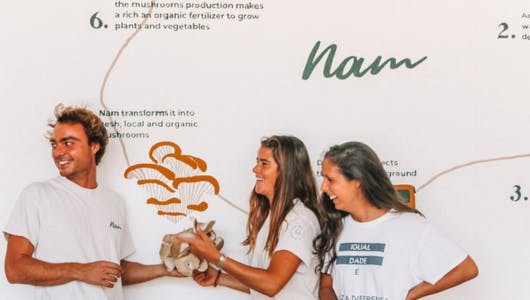
With the slogan “from waste to taste” Nãm Mushroom Farm is one of the most brilliant examples of circular economy applied to the food industry which we can observe in Lisbon today. Nãm was founded by Natan, a student from Belgium who moved to Lisbon and who started a mushroom farm, literally, in a building cellar. The particularity of this farm was that it used coffee grounds as soil. Natan would collect the coffee waste from cafes and restaurants, use it to produce mushrooms, and supply those ame businesses with these mushrooms – thus the circularity.
Nãm wants to only use what is locally available and, furthermore, create opportunities and value, where otherwise we could be only seeing waste. In the past half decade or so, Natan’s project has grown tremendously, from an independent project to now being a part of Grupo Nabeiro, a holding of companies which includes the giant of Portuguese coffee roasting and packing, Delta Cafés.
Nãm focuses on the cultivation of oyster mushrooms and, to a lesser extent, shiitake – an addition that only happened more recently. If you are curious to see what the mushroom growing process is like, and to learn more about the principles of circular economy, we would highly recommend a visit to Nãm’s Mushroom Farm in the neighborhood of Marvila. During a little over one hour, you can see the initial place where Nãm was commercially operating (they have meanwhile moved to much larger facilities in the outskirts of the city), you can learn how to grow your own oyster mushrooms at home with a mycelium kit that they sell and, of course, you can taste Nãm’s oyster mushrooms, grilled in front of you, and sample a cup of coffee by Delta too. If nothing else, you’ll get to buy mushrooms straight from the producer and, hopefully, challenge your ideas about waste and the incredible potential of circular economy when applied properly to businesses.
🍄 Rua Amorim 9, 1950-022 Lisboa
Weat Hugs by Weat Hubs
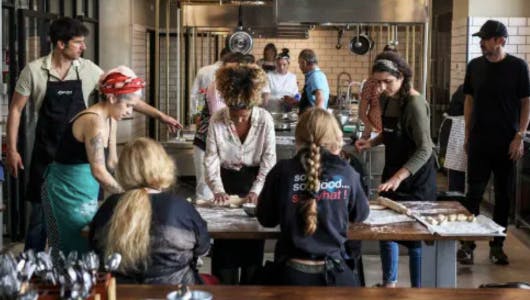
Weat Hubs markets itself as “the first gastronomic eco-system in Portugal”. In a spacious warehouse in the area of Alcântara, in Lisbon, Weat Hubs houses dark kitchens, as well as wide and greatly equipped spaces for cooking workshops and other kitchen related initiatives, such as team-building events.
During the Covid19 pandemic Weat Hugs was born. This is Weat Hubs’ way of giving back to the community, via a series of socially responsible initiatives. What was meant to be just a two day event, organically grew and now, every so often, Weat Hugs uses food as a medium to support the community.
They often invite companies to cook in their space, in order to prepare many meals which are donated to Refood to be distributed amongst the community. Refood, in its turn, is a citizen-driven organization which aims at reducing food waste by collecting surplus food from restaurants and shops, and distributing it amongst those in need.
ℹ️ Rua da Cintura do Porto de Lisboa, 1350-353 Lisboa
https://weat.pt/weat-hugs-responsabilidade-social
Do you know about other interesting social projects that are using food and cooking as a way of raising awareness? We would love to know about them! Please share them with us via Instagram by tagging us: @tasteoflisboa #tasteoflisboa
Feed your curiosity on Portuguese food culture:
To be a sustainable certified business
Sustainable things to do in Lisbon
Lisbon and its sustainable way of living
Real people, real food. Come with us to where the locals go.
Signup for our natively curated food & cultural experiences.
Follow us for more at Instagram, Twitter e Youtube
